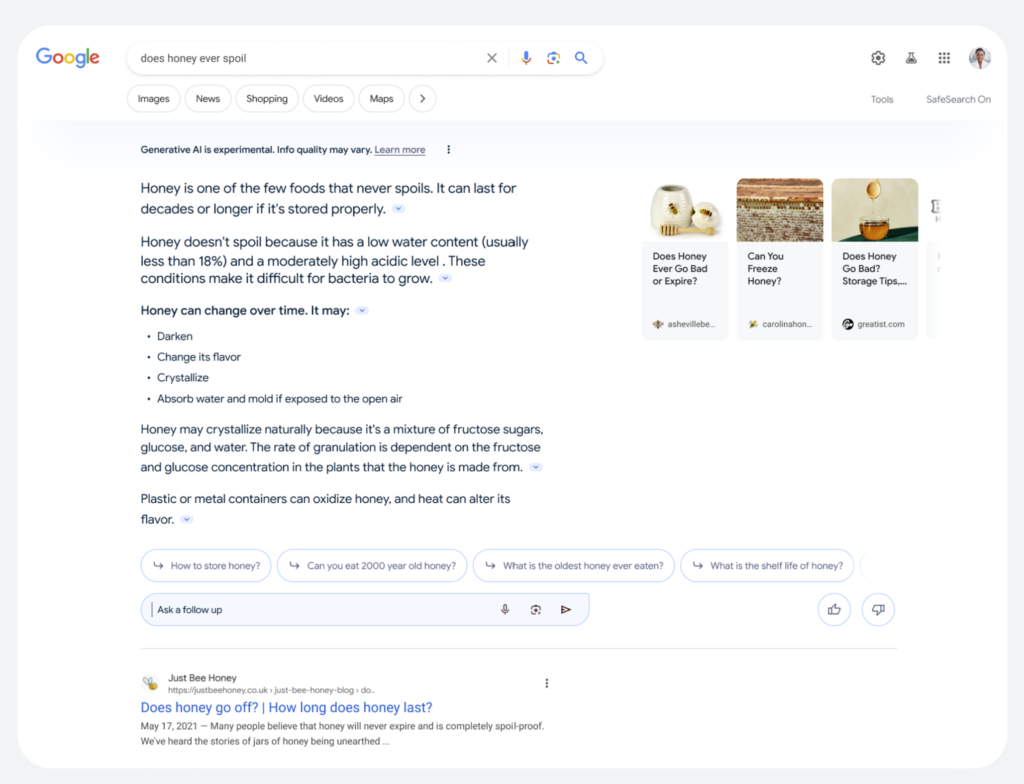Google I/O unveiled the integration of generative AI into its search engine, known as Search Generative Experience (SGE). This feature generates text in response to specific queries, providing a snapshot of relevant information above traditional search results.
SGE aims to streamline the user experience by providing comprehensive answers within the search interface, eliminating the need to visit multiple websites.
While beneficial for users, SGE poses challenges for publishers and advertisers, potentially resulting in decreased traffic. A study of 23 websites showed an average organic traffic drop of 18% to 64% due to SGE. However, results varied greatly, with some sites experiencing a 219% increase in traffic while others saw a 95% decline.
Despite concerns will Google’s SGE kill organic traffic, generative AI in search presents new opportunities for increasing search visibility and traffic. It’s not about Google stealing organic traffic but rather about effectively adapting strategies to leverage these changes.
What the Heck is Google SGE?
The Search Generative Experience (SGE) is a revolutionary way to search the web using generative AI, which can create new content like text, images, and code.
SGE aims to provide more comprehensive and informative answers to search queries by generating step-by-step guides, summaries of complex topics, and different perspectives on questions.

Here are some ways SGE can help search engine users:
- Get creative: SGE can help you generate creative ideas, such as recipes, blog post topics, or even code snippets. This can be helpful if you are looking for inspiration or if you need to get started on a project.
- Compare and contrast different options: SGE can help you compare and contrast different products, services, or ideas. This can be helpful when making decisions, such as which car to buy or which university to attend.
- Understand complex topics quickly: SGE can generate summaries of complex topics, such as scientific papers or historical events, in a way that is easy to understand. This can save you a lot of time and effort, especially if you are new to a topic.
- Add to Sheets function: This feature allows you to “insert a search result directly into a spreadsheet and share with friends. It’s your perfect research companion for planning a trip and adding info to your itinerary, or keeping track of other information you’ve found on Search.”
Although still in development, SGE has the potential to revolutionize the search process by making information easier to understand and learn from, ultimately helping users find answers faster.
How Google SGE will impact your traffic?
Google’s Search Generative Experience (SGE) often provides AI-generated answers that differ from the top 10 organic search results, according to a recent study. This discrepancy raises concerns about potential decreases in organic traffic to websites, as searchers can obtain answers directly from Google’s AI-generated responses.
The study found that the majority of the time (93.8%), the URLs in generative content are completely different from those in organic search results. SGE displays about 10 links on average, but only four unique links from four different websites, with two or three links often pointing to the same website.
SGE results appeared for 86.8% of the keywords analyzed, indicating that 13.2% of keywords did not trigger SGE content. The study was based on data from 1,000 commercial keywords collected in December 2023, across various categories.
So Will Google’s SGE Kill Organic Traffic post-launch?
Google’s Search Generative Experience (SGE) is set to go live in early 2024 after completing its testing phase in Google Search Labs. Currently, only a select few in the US can enable SGE while browsing on English-language Android mobile devices with the latest Google app.
SEOs have been preparing for SGE’s impact, with predictions suggesting a significant 25% drop in organic traffic for all websites when SGE goes live. The AI-powered Snapshot provides detailed answers at the top of the SERPs, potentially leading users to click away from traditional search results.
To prepare for this shift, it’s crucial to optimize your site for SGE. Focus on building a reputable backlink profile, targeting longer, conversational queries, and aligning with Google’s E-A-T guidelines (experience, expertise, authoritativeness, and trustworthiness).
If you’re already ranking well, you may have a better chance of being featured in the SGE Snapshot. However, classic technical and on-page SEO factors still apply, so regular audits are essential to maintain visibility in the evolving search landscape.
How to Optimize for Google SGE right now and stay ahead of the game post-launch
What’s intriguing is the method Google employs to generate its answers, drawing from the top pages in its results.
To increase your chances of appearing in the AI-generated snapshot, you’ll need to adjust four aspects of your SEO approach.
The Goal is to Focus on Information Gain
Google’s SGE extracts unique facts from top pages, including images, e-commerce results, links, and text, as seen in the image below.
Google aims to aggregate diverse information from various sources. If you’re a lower-ranking page repeating what’s already been said, it’s unlikely Google’s SGE will cite you. Simply rehashing content already on the SERP won’t suffice.
What’s crucial now is information gain. To be cited as a source for the AI-generated answer, you must provide new facts, opinions, and data. Covering new angles and adding unique opinions will enhance your chances of being featured.
Ensure Readability and be direct
Google’s SGE highlights extracted text from the source page, indicating what Google “read” to generate its answer.
To increase your chances of being cited, optimize your content for readability. Focus on providing direct answers, clear headings, and comprehensive FAQs. The easier your page is to parse, the more likely Google will cite you. Avoid overly complex language or unnecessary embellishments.
Opinionated Content
Google is increasingly bypassing traditional search results with its AI-generated answers, particularly for simple queries that require straightforward factual answers. This can lead to fewer clicks through to corresponding websites, as users’ questions are answered directly in one or two paragraphs.
If your SEO strategy relies heavily on glossary terms and thin, low-quality content, you may see a decline in traffic from Google.
To combat this, focus on creating opinionated content with a clear perspective that isn’t easily answered by an AI snapshot. Users seek opinions from trusted sources, as evidenced by the common addition of “Reddit” to searches.
For middle and bottom-of-funnel content, prioritize in-depth, opinionated content with original data, rich media, and perspectives from customers, employees, and other real people to remain relevant in Google’s evolving search landscape.
Author more targeted content
Google’s Search Generative Experience (SGE) may reduce organic traffic and increase zero-click searches, but SEO content creation remains essential. User-friendly, comprehensive content is still crucial.
AI-driven search results personalize content based on individual context like location, search history, and device. This shift underscores the importance of resonating with diverse audiences through tailored optimization.
Brands should focus on creating engaging content and experiences. Providing original, high-quality insights tailored to the audience and leveraging trusted experts will be key.
Creating derivative, AI-generated content without human creativity will harm SEO efforts. Balancing efficiency with original, user-friendly content is essential.
Build additional trust signals
In today’s digital landscape, trust is synonymous with search. Google has long emphasized E-A-T factors (Expertise, Authoritativeness, Trustworthiness). However, with the advent of generative AI in search, websites must prioritize trustworthiness by offering valuable content that addresses customer needs.
This shift implies a reevaluation of the significance of backlinks, content length, and internal linking. The future of trust will include additional signals like user-generated content (UGC) and reviews. Content not only drives traffic but also establishes trust and showcases expertise. As such, a successful content strategy hinges on these principles.
Concluding Words on Google’s Search Generative Experience
Google’s Search Generative Experience (SGE) represents a significant leap in search technology, harnessing the power of generative AI to provide users with more detailed, informative, and interactive search results.
This new approach to search promises to revolutionize the way we find and interact with information online, offering benefits such as quicker understanding of complex topics, better decision-making through comparison and contrast, and enhanced creativity through idea generation.
Will Google’s SGE Kill Organic Traffic?
The right answer is there will be changes and evolution in this marketing channel but Google Search is not going away anytime soon.
Frequently Asked Questions
Does Google SGE Provide AI-powered summaries?
When suitable, SGE provides an AI-generated summary to swiftly offer users an overview of a topic, including key considerations and helpful details. These summaries act as a starting point for users to delve into a variety of content and viewpoints available on the internet.
SGE also provides links to sources that corroborate the information in the summary, enabling users to verify the information and explore additional resources. This functionality allows users to explore a wide array of content from various sources, such as publishers, creators, retailers, and businesses, empowering them to make informed decisions and progress in their tasks.
How does Google SGE Enhance Follow-up Options?
Users can tap to “ask a follow-up,” refining their search or exploring new directions without restating context. Alternatively, they can tap suggested next steps to uncover relevant information or explore unanticipated questions. This generates a new overview with additional links to resources for further exploration.
Asking for follow-ups is particularly useful for complex or evolving information journeys. Generative AI simplifies asking follow-ups without repeating the previous context. After a follow-up question, such as “Why is this?” users will see a new AI-powered overview with links, enabling easy exploration of relevant web content.
How Does Google Search Generative Experience Help with Enhanced Vertical Experiences?
Generative AI in Search enhances information journeys related to verticals like shopping or local searches, which often involve multiple angles or dimensions to explore. In shopping, for example, generative AI uncovers key considerations and product information, aiding quicker and easier purchase decisions.
For product searches, generative AI creates a snapshot of notable factors and a variety of product options. SGE also offers product descriptions with relevant, up-to-date reviews, ratings, prices, and images. This current product information is available because SGE relies on Google’s Shopping Graph, the most comprehensive dataset of continuously changing products, sellers, brands, reviews, and inventory.
Likewise, SGE provides context about local places, utilizing AI-powered insights for easy comparison and exploration of options.












